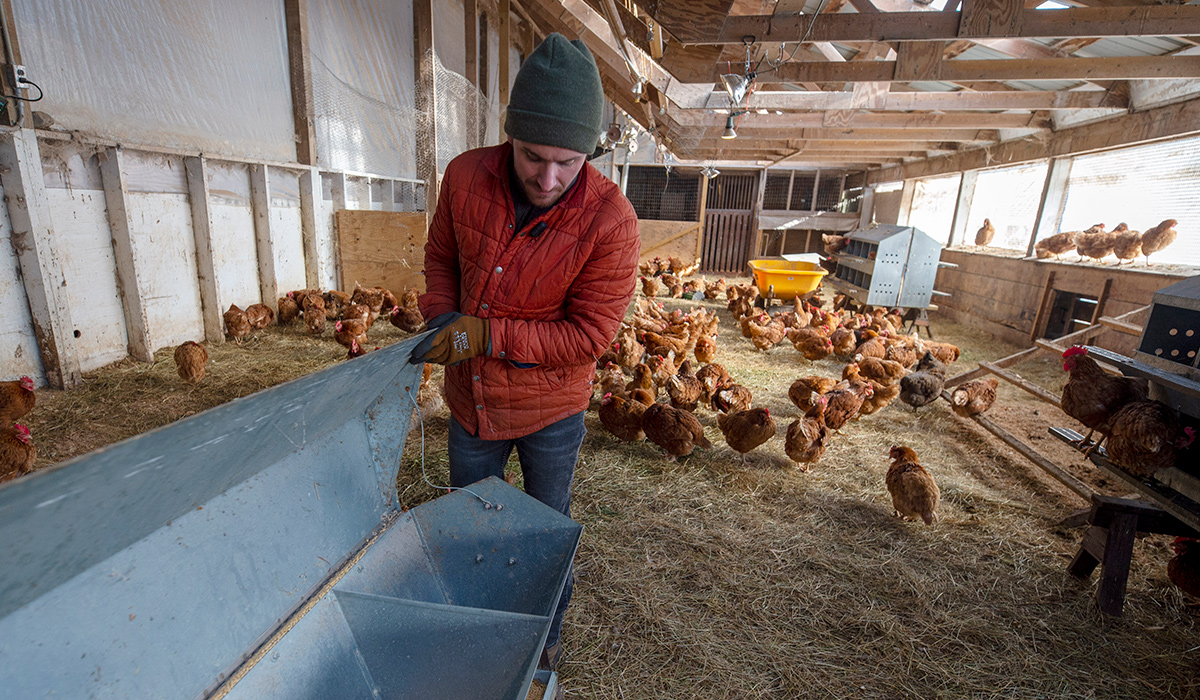Agriculture
A fowl virus: What the bird flu means for PA agriculture – and how to fight it
Avian influenza in the commonwealth: A City & State investigation.

MediaNews Group/ Reading Eagle, Mike Kemp/ Getty Images
The Pennsylvania Farm Show Complex & Expo Center in Harrisburg is typically used for celebrations. Each year, farmers from across the commonwealth flock to the facility in January to show off their handiwork – animals that they care for, prize-winning produce and other fruits from their labor in one of Pennsylvania’s top industries – agriculture. Over the years, it’s also become home to concerts, craft beer tastings and auctions.
But on a rainy day in April, Pennsylvania’s top agriculture official, Russell Redding, had a message that was far from celebratory. In fact, the news he was about to deliver threatened to disrupt the very industry that the facility was meant to showcase.
Speaking from the complex’s Cameron Street Lobby, Redding announced that the state was now on “high alert” after an outbreak of highly pathogenic avian influenza was discovered on a Lancaster County poultry farm – a finding that marked the first of many outbreaks in Pennsylvania.
Redding, at the time, stressed that the disease posed no direct threat to humans. To date, only one person in the U.S. has contracted the disease, and has since recovered. But the spread of the virus throughout poultry farms, Redding said, had – and still does have – the potential to disrupt the state’s economy and do real damage to the state’s poultry industry.

To date, there have been 17 outbreaks among commercial flocks in Pennsylvania, which have led to a loss of more than 4.2 million birds. The outbreaks have largely been confined to Lancaster and Berks counties, and while the spread of the virus in the commonwealth could have been much worse, it still had a major effect on farms in impacted counties.
“The spread was quite severe. At least 4.2 million birds were affected,” said Gino Lorenzoni, a professor of poultry science and avian health at Penn State University’s College of Agricultural Sciences, who said the disease has infected ducks, commercial egg layers and broilers, which are chickens bred for meat.
Lorenzoni said the avian flu can present in different ways. One of the main signs indicating that a flock could be infected is if birds begin dying without a clear explanation. Other symptoms include purple discoloration of a bird’s wattle, a lack of coordination, nasal discharge, a lack of energy and diarrhea.
The virus spreads largely through fecal matter and oral secretions, according to Lorenzoni, who said that the virus is “kept in nature” by wild, migrating birds that are infected with the flu but may not be exhibiting any outward symptoms. “They will be able to keep migrating or long distances and basically disseminating – spreading – the virus through fecal material and oral secretions,” he said.
The first outbreak in Pennsylvania prompted agriculture officials to warn residents about the impacts that further spread could have on the state’s economy and food supply, given that infected flocks must be euthanized to prevent continued spread.
Redding, speaking to City & State in an interview, said the dangers of highly pathogenic avian influenza have already been felt in parts of the state that have experienced outbreaks.
“You've got a $7.1 billion poultry industry in the state. It's 26,000-plus jobs – such a significant piece of Pennsylvania agriculture,” he said. “We have seen as a result of the 17 farms that were directly impacted just how devastating it is obviously to the birds, but also economically.”
Bird flu outbreaks have also resulted in financial and logistical challenges for farms where the virus has been detected, as well as those that fall within quarantine zones. Heather Lewis, whose family owns a poultry farm in Mount Joy, said during a press conference in July that her farm was unable to repopulate its flocks as a result of nearby outbreaks.
Lewis, whose farm raises 500,000 broilers, and also grows corn, beans and wheat, said her family was preparing for its next flock of chickens in early April when the flu was detected in her neighborhood.
“We were getting ready for our next flock of chickens which was scheduled to come in just a few days. That was when the first case of avian influenza was found in Pennsylvania, more specifically in our neighborhood. Then another farm tested positive, and then another, and we know how it went from there.”

However, Lewis’ farm, and others like hers, could now benefit from a new $25 million state grant program that offers financial relief for 91 impacted farms located within infected zones that have been established by the Pennsylvania Department of Agriculture. The program will fully reimburse losses up to $100,000, and will reimburse losses of over $100,000 on a percentage basis based on the number of applications and how much funding is available.
The grant program is the result of a $25 million investment in this year’s state budget for farm recovery efforts. The budget package also included $6 million to increase the testing capacity of the Pennsylvania Animal Diagnostic Laboratory System.
In addition to the state funding allocation for Pennsylvania farms, there’s another silver lining in the state’s battle against the bird flu – a decline in new outbreaks at commercial farms. The last reported outbreak in Pennsylvania came on June 2 – a development that Redding attributed to the biosecurity measures that farms and agriculture officials have taken since the first case was detected.
Lorenzoni, who serves on a state task force dedicated to responding to bird flu outbreaks, said biosecurity measures are crucial to curbing the spread of the avian flu. Precautions that are essential to limiting the spread include only wearing dedicated shoes and clothing when working with birds, washing hands frequently, disinfecting vehicles and equipment, limiting visors from nonessential farm personnel and deterring rodents and wild birds using fences or netting, he said.
Redding said farms have been “incredibly receptive” to biosecurity protocols to date. “We feel lucky or fortunate that we are where we are with the losses that we've incurred – it could have been a lot worse,” he said. However, just because there were few outbreaks reported over the summer months doesn’t mean the threat is gone.
Redding said that fall migration could result in wild birds commingling with commercial flocks, leading to a new surge in avian flu cases in the months to come, a worry that Lorenzoni also shared.
“It is very likely that the virus is going to remain circulating for some time,” Lorenzoni said. “So it's very likely that with more birds coming back from the fall migration, we can see those numbers of wild birds (testing) positive increase.”
